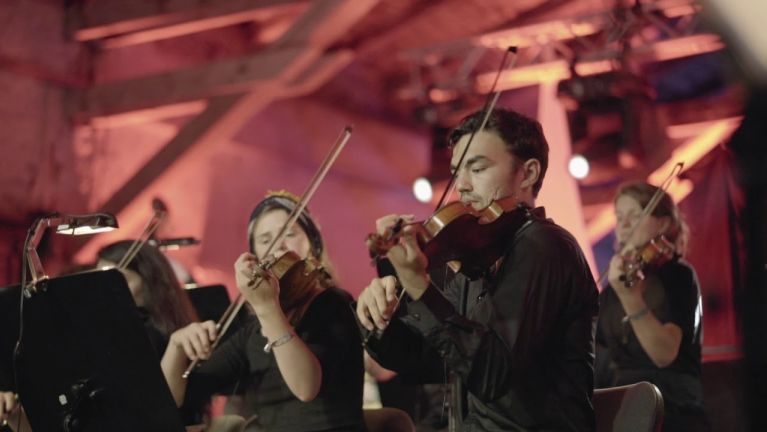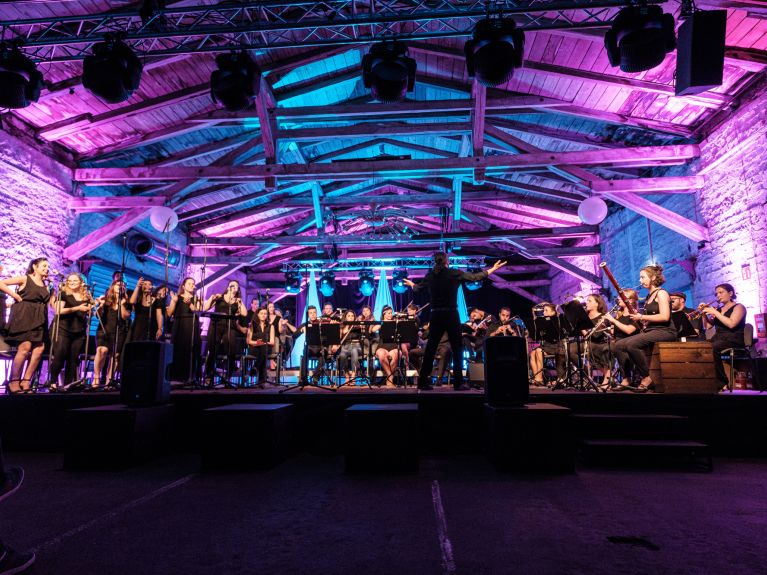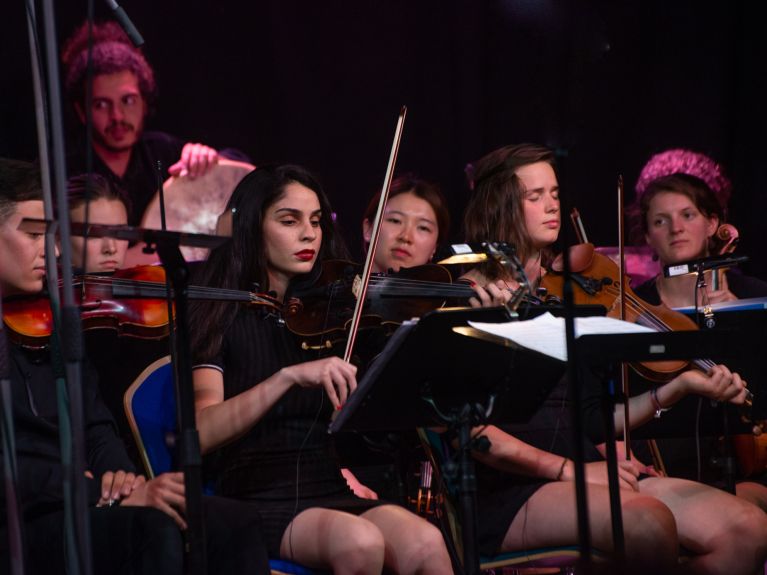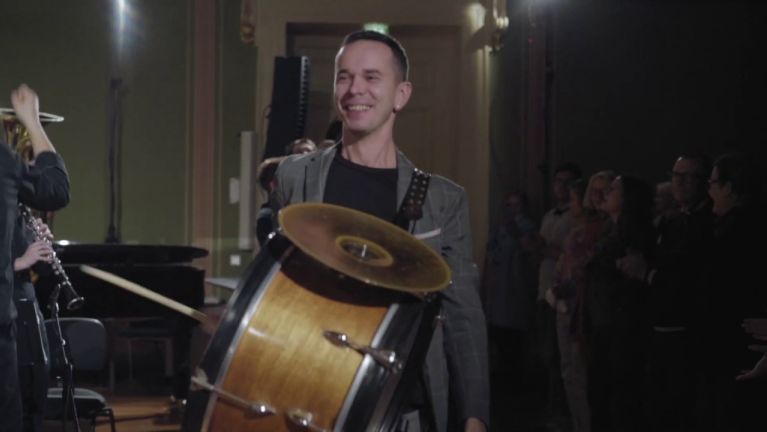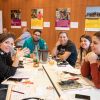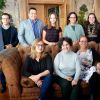Canon of cultures
Yiddish waltzes with Latin rhythms: the German-Israeli Caravan Orchestra thrives on musical contrasts.
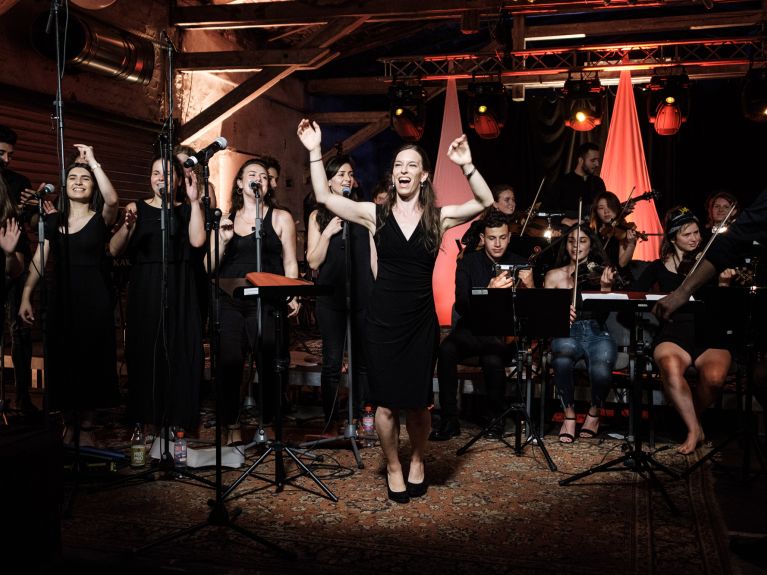
Many projects promote German-Israeli exchange, but few sound as good as the Caravan Orchestra. This collaboration between Yiddish Summer Weimar and the University of Haifa began in 2017. Nearly 30 musicians from Germany and Israel, mainly from the region around Haifa, meet for a two- to three-week period of rehearsals with subsequent concerts. A Caravan Choir was also launched in 2019.
The German musicians include Luise Fakler from Berlin. The violinist has been involved in the project from the start. She studied in Israel for a time and applied to join the orchestra because of her interest in the country. “I still really enjoy it,” she says. The orchestra is a musical adventure for her. “The way it works is really very unusual. We develop the pieces by ear, initially singing them, and we improvise a lot. Classical musicians often have difficulty with that, while those who come from jazz find it much easier,” explains Fakler. The groups are very mixed, she says. The German group includes musicians with classical training as well as jazz musicians, and many have incredibly diverse migrant backgrounds. The group from Haifa also includes Jewish, Muslim and Druze musicians. It can therefore happen that pieces by Naftule Brandwein, the famous Jewish clarinettist, alternate with music from Egypt, Algeria and Greece or a Yiddish waltz is combined with Latin rhythms.
Dieses YouTube-Video kann in einem neuen Tab abgespielt werden
YouTube öffnenThird party content
We use YouTube to embed content that may collect data about your activity. Please review the details and accept the service to see this content.
Open consent form“We leave politics outside”
Natalia Koretsky, a classically trained tuba player from Haifa, also grew up in this kind of diversity. Learning music by ear and not playing it from sheet music was a totally new experience for her. She says, however, that the most important thing about the Caravan Orchestra is: “We leave politics outside. We simply make music together and that’s what counts.” Meanwhile the Caravan Orchestra is “like a large family” for her, even if the rehearsals are very strenuous. “The greatest thing is the performances – when everything works and we see the audience’s eyes light up.”
Jeryes Murkus Ballan, one of the two conductors, also emphasises: “We don’t take politics onto the stage.” And even when he thinks about possible musical focal points as part of his preparation, he never knows who he will be working with. “Although in the meantime there is a group of musicians who have already taken part several times, it is still a new orchestra every year, with different styles.” The orchestra members then have to learn the repertoire within a couple of weeks of rehearsals, usually one in Haifa and one in Weimar. “That involves lots of enthusiasm and lots of adrenaline – for the conductor too.”
We leave politics outside. We simply make music together and that’s what counts.
More areas of musical overlap than anticipated
The orchestra – and since 2019 also the choir – is made up of musicians who are no older than 26 years of age. They apply for a two- to three-week stay in Haifa and Weimar. When making their choice, the project manager on the German side, Andreas Schmitges, and the musical directors pay attention to two things: that the numbers of participants from the two locations are roughly equal and that an ensemble is created that is not only musically diverse, but also capable of playing together. Even if the inclusion, for example, of oud, buzuq, recorder, keyboard, trombone, tuba, drums, electric bass or percussion is still highly unusual, the players have many things in common. Even musical realms as different as the worlds of eastern European Yiddish and Arabic-Ottoman music often have areas of overlap that people ought to be made aware of again. These common features are also to become a focal point in 2020, when conductor Ballan intends to make the music of the Ottoman Empire a special focus of the programme.
Like Purim, Rosh Hashanah, Eid al-Fitr and Christmas
The musical directors consider it important that when you play songs from a wide variety of cultures, you must not smooth out the differences – otherwise you end up with pop. What is more, the message is no longer the music itself, but the whole thing is “degraded” into a purely political project. Although the participants consciously want to keep politics out of the rehearsal room, there still remains a binding message that goes beyond the sounds alone. “Weimar is the right place for that,” believes Schmitges. That is also because the town with 65,000 inhabitants is a manageable size and the musical guests can easily find one another here for rehearsals and leisure – on the one hand, to make use of the cultural heritage of the small town where the poets Goethe and Schiller once lived and, on the other, to set this project of German-Israeli cooperation against “everything one otherwise hears about from Thuringia,” says Schmitges, alluding to the electoral success of right-wing populists in the German state. “Above all, it is also about listening to one another and discovering the musical heritage of the respective partner. That then leads to a common repertoire,” explains the project manager.
Dieses YouTube-Video kann in einem neuen Tab abgespielt werden
YouTube öffnenThird party content
We use YouTube to embed content that may collect data about your activity. Please review the details and accept the service to see this content.
Open consent formIt is like Purim, Rosh Hashanah, Eid al-Fitr and Christmas rolled into one – that is the ideal. It was not without reason therefore that the project was honoured with the Shimon Peres Prize in 2018. The participants are meant to recognise that their music belongs to them and is part of their identity. However, what they play is heard by others. And what you hear eventually also belongs to you – you can let it become your own song. Or part of a common canon.
You would like to receive regular information about Germany?
Subscribe here:
